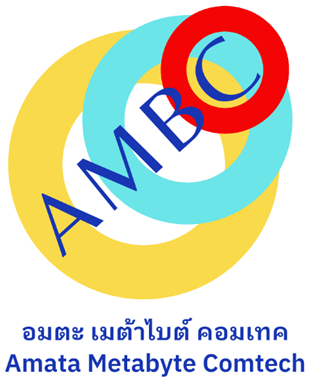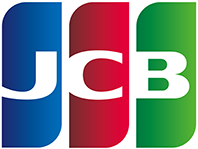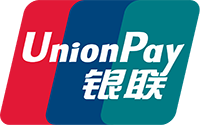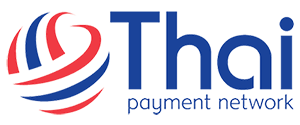AMBS Hospitality Blog
🌟 Songkran Booking Boom: Make Your Hotel the First Choice This Festive Season! 🌟

Bangkok: Wednesday 18 February 2025
Songkran is just around the corner! That means water fights, joyous crowds, and of course... fully booked hotels!
Did you know that during Songkran 2024, the average booking value surged by 30%? 🎉 For hoteliers, this isn’t just a festive season—it’s a golden opportunity to capture more revenue and delight your guests.
To stand out during this high-demand period, your commercial team needs more than just regular operations. Here’s how to maximize bookings and create unforgettable Songkran experiences:
✅ Create Exclusive Songkran Packages: Offer themed stays with water fights, Thai New Year rituals, and cultural excursions. Promote early and drive that booking momentum!
🤖 AI-Powered Personalization: Use guest data to offer tailored experiences, like room upgrades or Songkran-themed surprises.
🌟 Engaging Social Media Challenges: Build excitement with contests like “Best Water Fight Video,” rewarding participants with discounts or free stays.

🕑 Flash Sales with Countdown Timers: Create urgency with timed promotions to boost early bookings.
💳 Seamless Online Booking: Make it easy with a mobile-friendly engine, clear package details, and instant confirmation.
This Songkran, make your hotel the top choice and watch your revenue splash up!
Author: Nazmus Shaine Sakib
#Songkran2025 #HotelRevenue #TravelTrends #HospitalityMarketing #HotelSales
AI for Authentic Connection: Enhancing Meaningful Travel Experiences 🌍✈️

Bangkok: Tuesday 11 February 2025
The travel industry is evolving rapidly, and AI is at the forefront of this transformation. But how can we ensure technology enhances human connection rather than replaces it?
🔍 AI-Driven Personalization
A McKinsey report states that 71% of consumers expect personalized interactions. AI can analyse traveller behaviour, past bookings, and preferences to curate bespoke itineraries, suggesting hidden gems that go beyond cookie-cutter experiences.
🗣 Breaking Language Barriers
With AI-powered translation tools like Google Translate and real-time speech recognition, travellers can now communicate effortlessly, fostering deeper cultural interactions. According to a CSA Research study, 76% of global consumers prefer purchasing in their native language—highlighting the importance of localized engagement.
⚖ Ethical AI in Travel
AI personalization relies on data, but privacy concerns remain critical. The EU’s GDPR and California’s CCPA emphasize responsible data use. AI must be transparent, bias-free, and respect cultural sensitivities to build trust with travellers.
❤️ Keeping the Human Touch
A study by Amadeus found that 80% of travellers believe human interaction remains essential in travel planning. AI should complement—not replace—travel agents and hoteliers, ensuring personalized service with a human-first approach.
As AI reshapes the travel trade, balancing tech with authenticity will be key. How is your business leveraging AI to enhance guest experiences? Let’s discuss! 👇
Author: Nazmus Shaine Sakib
#TravelTech #AIinHospitality #PersonalizedTravel #HumanConnection #FutureOfTravel
Forget "Tourist Traps": Creating Meaningful Journeys for the Modern Traveller

Bangkok: Tuesday 04 February 2025
Alright, hotel sales and marketing gurus, let's chat about something a bit deeper than just heads in beds. The modern traveller isn't just after a pretty view; they're after experiences that resonate, that mean something. It's time to shift the focus from simply selling rooms to curating journeys.
We're seeing a huge demand for travel that goes beyond the typical tourist itinerary – experiences that are immersive, enriching, and, frankly, impactful. This isn't just a passing fad; it's a fundamental shift in what people want from their holidays.
So, how do we, as hotels, tap into this? It's about crafting itineraries that connect guests with the local culture in a genuine way. Think cooking classes with local chefs, partnerships with community-based tourism initiatives, or offering excursions that support environmental conservation efforts.
Crucially, it's about storytelling. What's the narrative behind your hotel, behind the local area? How can you weave that into the guest experience to make it truly memorable? Consider how your sales team can use personal narratives and anecdotes to engage potential visitors, and to create a sense of authenticity and connection.

And, of course, we need to balance the desire for adventure with a sense of responsibility. Ethical travel practices are no longer optional; they're essential. Promoting sustainable initiatives, supporting local businesses, and minimising environmental impact should be at the heart of everything we do.
Ultimately, it's about transforming a simple holiday into a transformative journey. The hotel that recognises this and actively caters to this desire will be the hotel that thrives. Let's ditch the tourist traps and start crafting meaningful travel experiences!
Author: Nazmus Shaine Sakib
#MeaningfulTravel #ExperientialTravel #SustainableTourism #HotelMarketing #CulturalImmersion
Tap into the Power of Experiential Gifting: A Valentine's Day Opportunity for Hotels

Bangkok: Wednesday 29 January 2025
Hotel Commercial Experts, are you looking for ways to boost your revenue and engage with today's travellers? Consider the immense potential of experiential gifting, especially around key holidays like Valentine's Day. Recent data shows that the 2024 Valentine’s Day period saw a remarkable $14.2 billion in spending, with a significant 40% of gifts purchased online.
But perhaps the most telling trend is that 41% of gift recipients are now preferring memorable experiences over traditional material gifts. This indicates a clear shift in consumer preference toward experiences that create lasting memories.

For hotels, this presents a tremendous opportunity. Across the industry, successful gifting campaigns around this period have seen impressive returns, with gift cards averaging hundreds of dollars in value. The experiences that resonate the most? Think relaxing spa days, elegant afternoon teas, and exquisite dining experiences – all within reach for hotels of all sizes.
By creating online gift options focused on romantic and experiential packages, you'll not only capture the attention of last-minute shoppers but also generate valuable revenue and build a stronger connection with your guests. These experiences create an emotional bond with your brand, turning a gift into a memorable moment.
The time to act is now. Ensure your online gifting strategy is primed for Valentine's Day 2025, and you’ll be well-positioned to make the most of this significant gifting opportunity.
Author: Nazmus Shaine Sakib
#HotelMarketing #ExperientialGifts #HotelRevenue #ValentinesDayMarketing #HospitalityTrends
Riding the Green Wave: How Sustainable and Ethical Marketing Drives Hotel Success
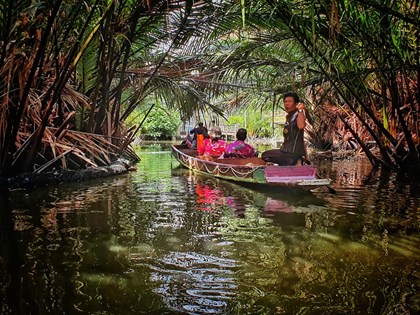
Bangkok: Wednesday 22 January 2025
Hey, Hotel Commercial Experts!
The travel landscape is shifting, and the new compass points firmly towards sustainability. It's no longer a niche preference; it's a mainstream expectation. According to Booking(.)com's 2024 report, a staggering 81% of global travellers actively seek eco-friendly accommodation. This isn't just a feel-good trend; it's a powerful market driver.

For hotels, this means that doing good translates into doing well. But it's not enough to simply be sustainable; you need to effectively market it. I'm not talking about greenwashing. Transparency is key. Authentically showcase your initiatives – whether you're running on solar power, actively reducing plastic, or sourcing local organic produce. Your website, social media, and even email campaigns should highlight these commitments. This approach resonates with the modern traveller who values ethical choices.

And remember, data is your best friend. Setting clear KPIs and using tools like Google Analytics or your PMS's reporting will provide a roadmap. If a campaign isn’t hitting the mark, don’t be afraid to adjust! The ability to analyse performance and pivot quickly is essential for staying ahead of the curve. Embrace sustainable marketing, track your progress, and watch your bookings grow.
It's not just about attracting the eco-conscious guest; it’s about building a sustainable future for our industry. Are you ready to ride the green wave? Let's discuss!
Author: Nazmus Shaine Sakib
#HotelMarketing #SustainableTourism #EcoFriendlyTravel #GreenHospitality #TravelIndustryTrends
Your Limit is Only You: Embracing 2025’s Commercial Hospitality Trends
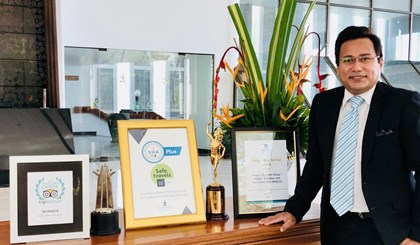
Bangkok: Tuesday 07 January 2025
As we dive into 2025, the hospitality industry is proving more dynamic than ever. The trends shaping our commercial strategies demand not just adaptation but a mindset that sees every challenge as an opportunity. "Your limit is only you" rings especially true in our field, where innovation and resilience are the keys to unlocking success.
The latest data reveals that personalized guest experiences are no longer optional—they’re essential. A report by Skift predicts that 74% of travelers are more likely to book with brands offering tailored experiences. Technology plays a huge role here, with AI-driven personalization tools increasing conversion rates by up to 30% (McKinsey, 2024).
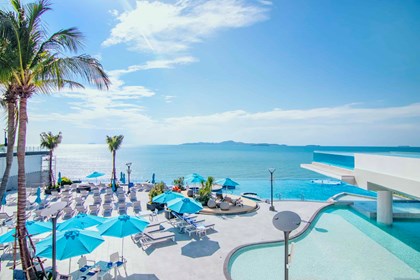
The rise of sustainability-driven bookings is another trend reshaping commercial strategies. According to Booking.com’s Sustainable Travel Report, 76% of travelers now prioritize eco-friendly stays. Hoteliers embracing sustainable practices have seen a 20% increase in repeat bookings—a clear win-win for the planet and the bottom line.
But let’s pause for a reality check. Hotel owners, GMs, and asset management experts: digitalization and technology are exciting, but we can’t afford to get caught up in the hype without a grounded approach. It’s crucial to understand your capital and operational expenditure requirements, their impact, and the ROI. The allure of modern tools must align with your financial goals. Let’s focus on implementation—rolling up our sleeves to integrate these technologies thoughtfully. Only then can we witness the true beauty of their transformative power.
Lastly, let’s talk open APIs and system integrations—a game changer in revenue management. The Hotel Technology Report (2024) highlights that properties leveraging open API ecosystems witnessed a 15% boost in revenue due to seamless connectivity between distribution channels and dynamic pricing systems.
The tools, data, and opportunities are out there. What’s holding you back? Let’s rise to the challenge, transform obstacles into stepping stones, and make 2025 a record-breaking year.
Author: Nazmus Shaine Sakib
#HospitalityInnovation #HotelRevenue2025 #SustainableHospitality #AIinHospitality #OpenAPIsInHotels
🎅 Master the Holidays: Proven Last-Minute Strategies for Hoteliers in 2024 🎅

Bangkok: Monday 16 December 2024
The holiday season is a golden opportunity for hoteliers to maximize bookings, boost guest satisfaction, and drive revenue. Whether you’re managing a boutique hotel or a vacation rental, these actionable tips will help you navigate the rush and make the most of this festive period.
Here’s how to make your property stand out and thrive:
1️⃣ Create a Holiday Atmosphere, Everywhere
From lobby decor to your online presence, embrace the festive spirit. Eye-catching holiday visuals can increase guest engagement both onsite and digitally.
2️⃣ Adjust Rates with Precision
Monitor market trends, demand patterns, and competitor pricing. Smart, data-driven adjustments can significantly improve revenue without deterring bookings.
3️⃣ Offer Memorable Culinary Delights
Holiday-inspired food and beverage offerings leave lasting impressions. Think regional holiday dishes, seasonal cocktails, or themed dining events that make your property unforgettable.
4️⃣ Tap into Local Markets
Attract nearby travellers with exclusive staycation packages. Offer perks like complimentary breakfast, parking discounts, or festive activities tailored to locals.
5️⃣ Elevate the Guest Experience with Thoughtful Details
Small touches like personalized welcome notes, festive amenities, or curated holiday playlists can transform a guest’s stay into a magical memory.
🎄 Insight: Hotels that leverage personalization and technology report up to a 20% higher satisfaction rate during peak seasons.
Make your hotel the destination of choice this holiday season! By combining creativity, strategy, and technology, you can turn the holiday rush into your most successful period yet.
Author: Nazmus Shaine Sakib
#HolidayTravel #HospitalityInnovation #RevenueGrowth #HotelTips #FestiveMarketing
Mastering Social Media Algorithms: Driving Hotel Revenue Through Smarter Digital Tactics

Bangkok: Tuesday 10 December 2024
In today’s fast-paced digital landscape, understanding and leveraging social media algorithms is no longer optional—it’s essential for driving visibility, engagement, and conversions in the hospitality sector. With platforms like Instagram reporting 93% of users discover new brands through the app, hotels must embrace algorithmic mastery to remain competitive.
Here’s how you can stay ahead:
1️⃣ Prioritize High-Quality Content: Algorithms reward engaging content. Posts featuring short-form video (under 1 minute) see a 38% higher engagement rate compared to static images (Hootsuite, 2024). Showcase your property's unique experiences, local culture, and stunning visuals in dynamic formats.
2️⃣ *Leverage Data Analytics: Advanced tools like Meta's Ads Manager provide granular insights into audience behaviour. For example, a recent campaign for a boutique hotel saw a 20% increase in direct bookings after refining targeting by guest preferences, such as wellness retreats or luxury stays.
3️⃣ Engage Consistently: Algorithms favour active accounts. Replying to comments, using polls, and going live can boost reach by up to 70%. Hotel brands that actively engage on social platforms see 1.3x higher click-through rates (Sprout Social, 2024).
4️⃣ Optimize Posting Times: Algorithms prioritize recency. Analyse your audience’s activity to post when they’re most active—commonly between 7–9 PM local time.
5️⃣ Invest in Employee Advocacy: Encourage team members to share branded content. Employee shares generate 8x more engagement than corporate posts, creating authentic visibility for your hotel.
By mastering these tactics, hotels can stay ahead of algorithm changes and boost their commercial success. It’s not just about creating content—it’s about delivering the right message, at the right time, to the right audience.
Let’s unlock your hotel’s digital potential together! 🌟
Author: Nazmus Shaine Sakib
#DigitalMarketing #HotelRevenue #ContentCreation #SocialMediaStrategy #HospitalityLeadership
Revolutionizing Hotel Bookings: A Sustainable, Data-Driven Future

Bangkok: Thursday 05 December 2024
Revolutionizing Hotel Bookings: A Sustainable, Data-Driven Future
What if your hotel booking site wasn’t just for rooms but a gateway to an entire travel ecosystem? Picture this: A guest books a room and seamlessly adds flights, local transportation, attraction tickets, and even eco-friendly activities—all through a single, dynamic platform enhanced by AI and big data.
Leading examples like Marriott’s Bonvoy platform have already tapped into bundling services, offering dynamic packages that include stays, flights, and car rentals. Similarly, Accor’s ALL program uses data-driven insights to deliver personalized travel options, boosting loyalty by 30%. Expanding these capabilities to include AI-powered interactive concierges could take guest personalization to a new level.
Big data is the backbone of this transformation. By analysing guest preferences, booking patterns, and sustainability trends, hotels can curate hyper-personalized travel packages. For example, a study by Deloitte found that 42% of travellers prefer eco-friendly options, and offering such sustainable packages can increase bookings by 25%.
Integrating sustainability into this ecosystem is key. Imagine offering carbon-neutral flights, green transportation like e-scooters, and tickets to eco-friendly attractions. According to a recent Expedia report, 60% of travellers are willing to pay more for sustainable travel options. These initiatives not only reduce the environmental footprint but also attract conscious travellers who value ethical tourism. '
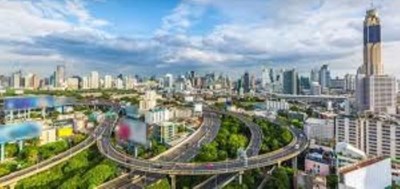
By becoming a one-stop travel hub, hotels can foster direct bookings, reduce reliance on OTAs, and create new revenue streams. This approach benefits the entire ecosystem—guests, communities, and the environment.
The time to act is now. Hotels that invest in such innovative, data-driven platforms will lead the way in creating unforgettable journeys while contributing to a sustainable future.
Can we deliver it?
Author: Nazmus Shaine Sakib
#SustainableTravel #DynamicBookingEngine #BigDataInTourism #HospitalityInnovation #EcoFriendlyTourism
Embracing SWOP and Navigating VUCA: A Balanced Approach for Hospitality Success
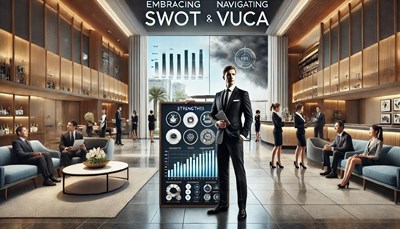
Bangkok: Tuesday 03 December 2024
In the dynamic world of hospitality, strategic planning tools like SWOT analysis (Strengths, Weaknesses, Opportunities, Threats) are invaluable. They help us refine our commercial, marketing, and sales strategies, aligning them with our products and services. But in today’s unpredictable landscape, VUCA (Volatility, Uncertainty, Complexity, Ambiguity) provides a complementary lens, helping us anticipate challenges and adapt with agility.
Consider a recent success story: A boutique hotel in Bangkok faced a sudden drop in international bookings due to political instability—a classic example of VUCA in action. Through SWOT analysis, the hotel identified its strengths (personalized guest experiences) and an untapped opportunity in local staycations. They pivoted their marketing strategy, launching "Rediscover Bangkok" packages targeting urban residents.
At the same time, they embraced the VUCA mindset. By acknowledging volatility, the management team implemented flexible pricing models. To address uncertainty, they strengthened digital channels, ensuring real-time updates to guests. Tackling complexity, they streamlined operations using tech tools, and for ambiguity, they fostered a culture of resilience, empowering staff to adapt to evolving guest needs.
The result? Occupancy rates surged by 35% during a turbulent quarter.
In the hospitality industry, SWOT builds strategy, and VUCA ensures preparedness. Together, they enable us to not just survive, but thrive, in an ever-changing environment.
Author: Nazmus Shaine Sakib
#HospitalityLeadership #StrategicPlanning #VUCA #SWOTAnalysis #AdaptAndThrive

